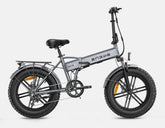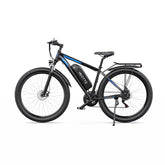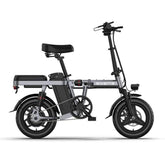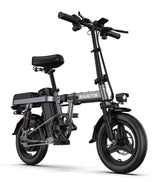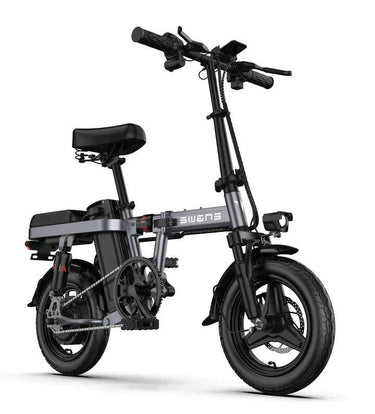E-Bikes vs. Cars: The Future of Urban Mobility and Sustainable Travel
In a year dominated by climate disasters and increasing concerns over global warming, governments worldwide are urging citizens to shift towards more sustainable modes of transportation. While electric cars have gained immense popularity, there’s a growing realization that e-bikes offer a far more effective solution for urban mobility.
A recent study highlighted that although electric cars are environmentally friendly, they may inadvertently lead to urban congestion and increased vehicle numbers. With lower operating costs than fuel-powered cars, electric vehicles could encourage more ownership, exacerbating issues such as longer commute times, rising urban sprawl, and potential negative health effects due to inactivity.

So, while electric cars remain a step in the right direction, are they truly the best option for city dwellers? Or are electric bikes the smarter, more sustainable alternative?
Why E-Bikes Outshine Electric Cars in Urban Areas
1. Solving Traffic Congestion
As cities expand and populations grow, more vehicles are hitting the roads, causing severe congestion. The limited space in urban areas means that every additional car only adds to the problem. E-bikes, on the other hand, take up far less space, enabling riders to navigate through traffic efficiently and reduce commute times.
2. Cost-Effectiveness
Electric bikes and scooters are considerably cheaper than electric or fuel-powered cars. The lower upfront costs, minimal maintenance expenses, and the absence of fuel expenses make them a financially sound alternative for daily commutes.
3. A Healthier Alternative
Unlike cars, e-bikes promote an active lifestyle. With pedal-assist technology, riders get the benefits of exercise without excessive exertion, making cycling accessible to people of all fitness levels. Regular e-bike use can improve cardiovascular health, enhance mental well-being, and help combat obesity.
4. Parking Convenience
One of the most frustrating aspects of urban driving is parking. With an e-bike, parking is virtually stress-free. They can be stored easily in apartments, offices, or public bike racks without requiring expensive parking permits or dedicated parking spaces.
5. Reduced Carbon Footprint
While electric cars produce zero emissions, their manufacturing process, particularly battery production, contributes significantly to carbon emissions. E-bikes, being smaller and requiring less energy to operate, have a much lower overall environmental impact, making them a greener option.

Shifting Towards a Bike-Friendly Future
The world’s cities have long been designed around automobiles, with highways, parking lots, and roads dominating the landscape. However, some progressive cities are now prioritizing cycling infrastructure, proving that an e-bike revolution is not just possible but necessary.
Urban areas with dedicated cycling lanes, bike-sharing programs, and car-free zones are thriving, encouraging more people to switch to e-bikes. Countries like the Netherlands and Denmark are prime examples of how a bike-centric urban design can significantly enhance the quality of life.
Addressing Common Concerns About E-Bikes
1. Are E-Bikes Practical for Everyday Use?
Absolutely! With improved battery technology and extended range capabilities, modern e-bikes can easily handle daily commutes, errands, and leisure rides. They can replace cars for short- to medium-distance travel, reducing dependence on fossil fuels.
2. What About Long-Distance Travel?
Many e-bikes now come equipped with high-capacity batteries and dual-battery systems, allowing riders to travel longer distances without worrying about running out of charge. Additionally, advancements in charging infrastructure make it easier to find charging points in urban centers.
3. How Safe Are E-Bikes?
E-bikes are designed with safety features such as enhanced braking systems, integrated lights, and smart locking mechanisms to prevent theft. Wearing a helmet and following traffic regulations further ensures a safe riding experience.
The Rise of Smart E-Bikes
Modern e-bikes are packed with cutting-edge technology, making them even more appealing. Features like GPS tracking, anti-theft alarms, smartphone integration, and regenerative braking make them a highly efficient and secure mode of transport. These innovations have propelled the e-bike industry into rapid growth, transforming them from a niche market into a mainstream mobility solution.
A Call to Action: Time to Rethink Urban Transport
With cities becoming increasingly congested and the environmental crisis looming, the need for sustainable transport solutions has never been greater. E-bikes offer an exciting opportunity to rethink urban mobility, combining efficiency, cost-effectiveness, and environmental consciousness.
Governments and urban planners must accelerate the transition by investing in cycling infrastructure, offering subsidies for e-bike purchases, and promoting policies that encourage bike-friendly urban development.
Conclusion
The future of urban transportation isn’t just about replacing fuel-powered cars with electric ones—it’s about reimagining how we move in cities. E-bikes have the potential to revolutionize urban mobility by offering a cleaner, healthier, and more practical alternative to traditional vehicles.
As we stand at the crossroads of climate action and urban development, embracing e-bikes could be one of the most transformative steps toward a sustainable future. The time to switch is now—will you be part of the movement?


